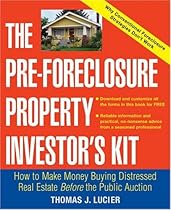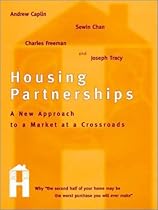Equity sharing could hit the main stream as an important stepping stone to home ownership if the Federal Housing Finance Regulatory Reform Act of 2008 creates an equity sharing program to help bail out home owners facing foreclosure.
by Broderick Perkins
© 2008 DeadlineNews.Com
Deadline Newsroom - Federal legislative relief for the nation's housing crisis contains a provision that could turn a rarely-used home financing option -- equity sharing -- into a key stepping stone on the path of home ownership.
Along with other provisions, the federal legislation would create a Federal Housing Administration-sponsored equity sharing program to refinance loans at a discount for home owners facing foreclosure. In return, home owners would share future equity gains with the FHA.

"The feds are about to take equity sharing to the next level," says Jeff Langholz, founder and CEO of HomeEquityShare.com, an online network that matches equity sharing partners.
Not only would the government effort save an estimated 400,000 homes from foreclosure, federal backing could raise the profile of the unconventional creative financing tool and push it into the mainstream of housing finance.
"Every transition in life comes with intermediate stages. Before you are married you get engaged, before you get your driver's license you get a learner's permit. Before you get to homeownership what intermediate transition is there?" he asks.
Langholz is banking on the equity sharing provision in the federal relief package. That may be a safe bet.
Both the U.S. House of Representatives (H.R. 3221 by Rep. Nancy Pelosi, D-CA) and the U.S. Senate (the unnumbered bill known as the "Federal Housing Finance Regulatory Reform Act of 2008" by Sen. Chris Dodd, D-CT) this summer passed versions of the same relief package. Both versions contain the equity-sharing provision.
In late July, federal legislators were reconciling differences for final approval, which is expected "certainly before the August break," said Pelosi spokesman Brendan Daly.
Equity sharing basics
Equity sharing is a symbiotic relationship -- as well as a legal agreement -- between two or more parties holding title to one home. Two or more parties share title in order to share the risk, thereby reducing the risk for both parties. Inevitably, however, home price appreciation is the bottom line. The property must grow in value over the term of the deal for it to really pay off.
Parties in the mutually beneficial relationship, and their roles are:

• The seller. The seller can use equity sharing as a way to quickly sell in a slow market. The seller can also become the investor and retain a stake in the property.
• The investor. Typically a non-resident owner, the investor provides the initial financial leverage in the form of a down payment or larger stake. He or she can be a family member of the occupying home owner (see below), a trusted friend of the occupying home owner or some private entity, say a professional investor. The investor gets tax deductions for his or her prorated share of the deal. With time, provided equity grows, the investor enjoys a joint venture-like return on the bulk of the investment.
• The occupying home owner. Often savings-poor, but income-rich, one person, with little or no money down, becomes the occupying home owner. He or she pays the mortgage and other costs associated with owning and occupying a home -- including taxes, insurance, maintenance and the like.
The occupying home owner gets to deduct a prorated share of the mortgage interest and property taxes, along with other tax breaks that come with home ownership. With enough equity growth, the occupant can eventually cash out, buy out the investor, keep the home or use the equity gain to buy another.
• Title to the home can be held in a variety of ways -- joint tenancy with right of survivorship, tenancy in common, partnership or as a living trust.
Variations on equity sharing
Like its creative financing cousins -- seller financing and lease options -- equity sharing often makes the news as an alternative financing tool buyers and sellers turn to in tough, cash- or credit-tight markets. That's because equity sharing lessens the upfront costs buyers face in any market. When buyers can buy, sellers can sell.
"In today's market, equity sharing makes sense for buyers because it allows them to buy a home which they couldn't buy on their own. Because the equity sharing an investor contributes to the down payment, the buyer needs to borrow less lowering his or her payment and risk. In exchange, the buyer gives up a portion of any home appreciation. This is a worthwhile bargain for people who would not otherwise be able to afford to buy," says Andy Sirkin, attorney/partner with Sirkin Paul Associates in San Francisco.

However, a tight market isn't mandatory.
• Equity sharing also can be strictly business -- an investment purely for financial gain, provided the investor and buyer are willing to risk they'll realize enough appreciation to make the deal pay off.
• The federal legislation points to equity sharing as a tool to help stave off foreclosure. Even without federal backing, a defaulting homeowner can privately bring in an equity share investor to buy a lump sum stake in the property or subsidize monthly payments over time, that is, pay some or all of the monthly mortgage for some period. Again, for the effort, the investor gets an equity stake.
• Equity sharing can also be used by a financially secure seller who doesn't need to drop his or her home price, but wants to move. With an investor buying an 80 percent stake, the seller could retain 20 percent ownership, and get another home. Then, say five years down the road, the seller and investor sell the home, each taking an appropriate share of the equity. Again, and always, appreciation must be sufficient for the deal to pay off.
• Some local governments offer equity sharing deals. The City of San Jose, for example, offers an equity-sharing, deferred-payment loan program for qualified, first-time, low- and moderate-income households.
The program provides housing from select, targeted properties in new housing developments.
Qualified buyer-occupants pay zero. They live mortgage-payment free. There's no down payment, no monthly payment and no interest payment, until it's time to sell or the loan is due in 45 years.
However, when the home is sold, the sale price goes to the city, which has been picking up the monthly mortgage tab. The city (in exchange for also paying the interest) and occupant share any equity gain on a prorated basis based on the terms of the mortgage (to say more here about those terms gets really involved. I'd have to give examples). If the gain is sufficient, the occupant can use it to buy his or her own home.
The occupant can also stay put for the 45-year term of the mortgage again, cost free. However, the loan is due at the end of the term, and again, any proceeds go to the city. If the occupant remains until the end of the term, the city relinquishes any and all claims on equity gains.
Either during a sale before the end of the term or at the end of the term, the occupant is not obligated to use the equity to buy a new home, but can choose to use that gain as he or she wishes.
In the past several years, San Jose has housed hundreds of families with variations of its equity sharing program.

The devil's in the details
Equity sharing is not a silver bullet.
They are most often short term contracts of five, seven, ten years or so -- to make sure the period of risk exposure is short. At the end of the term, the net proceeds from the sale are split, doled out according to contract.
Because the deal relies upon appreciation within a short term, equity sharing can be a tough sell in a depreciating market. They are perhaps better suited for a bottom market or market already on the rise.
The current market also makes the deals dicey because, as of yet, there's no federal backing.
Equity sharing is also a two-sided coin when it comes to the lender.
Risk averse lenders have put a squeeze on all credit and may not look favorably on all but the most "plain vanilla" mortgages.
On the other hand, if the investors has cash for his, say, 80 percent stake and the buyer-occupant needs a mortgage of only 20 percent of the value of the home, the lender might bite.
"Obviously if you are only going to borrow, say, a 30 percent loan (because the investor antes up 70 percent) and there are two people, you have a better chance. You are always better off if you have another person, but lenders are really spooked," said David Hofmann, a San Jose real estate attorney with Hoge Fenton Jones & Appel, Inc.
"Even people who recently qualified are having a tough time. Lenders don't want to see anyone on any loan with any credit issues. Most lenders faced with a default will just take the property back, " Hofmann added.
Equity sharing also remains obscure because the deals can be complicated.
The deals must be legal and binding contracts designed to provide an equitable means to an end. It must include provisions for any disputes or disagreements that might arise during the term. The contracts typically don't allow extracting any returns until the term is up, unless there's an escape clause. Escape clauses come with provisions that include stiff cash penalties for early outs and other resolutions.
Finally, even if the equity sharing deal is designed to create a home owner, its' underlying investment approach triggers a different set of underwriting and tax rules, compared to a conventional home buy.
Buyers will almost always need an equity sharing-experienced team -- real estate agent, attorney and tax professional -- to set up the transaction's contract.
"These deals can give some new lenders heartburn, but there is surprising interest from senior lenders who were around when shared appreciation mortgages (SAMs) were around in the 1980s," said Langholz.
Here's a list of equity sharing resources
• The HomeEquityShare.com network for home equity match ups between sellers, buyers and investors, based in Monterey, CA.
• Larkspur, CA-based Marilyn D. Sullivan's "The New Home Buying Strategy," (Venture 2000, $25.95)
equity-sharing manual.
• San Francisco, CA-based Andy Sirkin, Sirkin Paul Associates and "Basic Equity Sharing Structure" manual.
• In San Jose, CA, real estate attorney David Hofmann with the Real Estate Group at Hoge Fenton Jones & Appel, Inc.
• The Don Reedy, Peter Haglund, Howard Schwartz and Richard Borkowski BuyHalfAHouse.com team.
Also see: "Facilitating Shared Appreciation Mortgages to Prevent Housing Crashes and Affordability Crises"
© 2008 DeadlineNews.Com
Advertise on DeadlineNews.Com
Get news that really hits home for your Web site or blog from DeadlineNews.Com.
Broderick Perkins, an award-winning consumer journalist of 30 years, is publisher and executive editor of San Jose, CA-based DeadlineNews Group -- DeadlineNews.Com, a real estate news and consulting service and Web site and the new Deadline Newsroom, DeadlineNews.Com's news back shop. In both cases, it's where all the news really hits home.
DeadlineNews.Com's Editorial Content Is Intellectual Property • Unauthorized Use Is A Federal Crime
Read more!













